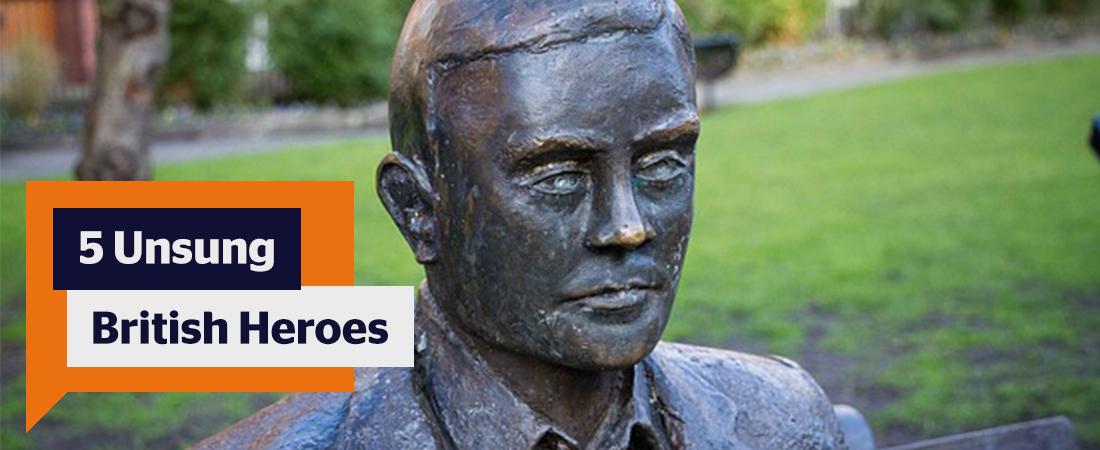5 British Unsung Heroes You Need to Know
Britain is home to many heroes. What makes a hero is incredibly personal. As Afua Hirsch uncovers in the Battle For Britain’s Heroes, we can be protective of those that we consider heroes but others may see as villains. There are many unsung heroes in Britain too. Together TV wanted to take a look at a few names that us Brits owe a lot to, and who may have slipped through the cracks.
1. Dr Rosalind Franklin
Dr Rosalind Franklin was a British scientist whose x-ray photograph, Photo 51, was paramount in understanding DNA and structural molecular biology. She worked in the laboratory of John Randall in King's College London where she met Dr Maurice Wilkins who was also researching DNA. Dr Wilkins is said to have shown her photo to scientists Dr James Watson and Dr Francis Crick of Cambridge University without her permission. This photo enabled them to determine the double helix shape of DNA, and their research won them a Nobel Prize. Dr Franklin’s contribution wasn’t referred to, and she passed away before the Nobel Prize ceremony in 1962.
2. Alan Turing
It was Alan Turing who cracked Nazi Germany’s “unbreakable” code with his dedication of using machines to problem solve. Until 2013, when he received a posthumous pardon by Queen Elizabeth II, his contribution was overlooked. He had been prosecuted for “gross indecency” for being a homosexual, and with a criminal record he was dismissed indefinitely from working for the Government. Turing’s approach to code breaking has been attributed to the start of modern computing. He strongly believed in the notion that we can use one machine for all possible tasks. Post-war, he went on to design a computer that would function like a human. Whilst it was never made, his ideas have been considered the beginning of artificial intelligence.
3. Mary Wortley Montague
There has not been a case of smallpox in the United Kingdom since 1978 and much of that thanks we owe to Mary Wortley Montague. She introduced inoculation to Western medicine having seen its benefits first hand in Turkey in the 1710s. Inoculation is the method of immunising a person to a disease by exposing them to a tiny dose of it through a small open wound. Needless to say, Montague was met with opposition when she first tried introducing inoculation to the British medical society. This opposition just fueled her to show the efficacy of inoculation on her own daughter in front of an audience. The practice slowly caught on as publicity swelled, leading eventually to the vaccination method we use today.
4. Chad Varah
The Samaritans emergency phone line was created by vicar Chad Varah to help suicidal people. He felt compelled to help after conducting the funeral of a 14-year-old girl who had taken her own life after mistakenly understanding that her menstruation was a sexually transmitted disease. Suicide was illegal up until 1961, which meant many felt they were unable to talk about suicidal thoughts. Varah vowed to offer help to those who felt they had nowhere else to turn. He started the Samaritans in 1953 to “befriend the suicidal and despairing.” Varah’s approach and compassion will have saved millions of lives since its inception.
5. Dr Helen Sharman
The first British person in space was chemist Dr Helen Sharman. In 1991, Dr Sharman and two Russian cosmonauts ventured to the USSR space station for eight days. The expedition was called Project Juno and it was an important act for UK and Soviet relations. The Soviets ended up funding the expedition, hence why Dr Sharman isn’t considered Britain's first official astronaut. However, she was the first Briton and the first European woman in space. She has since become an inspiration for women in STEM.
The Battle for Britain’s Heroes is presented by journalist and author Afua Hirsch. In the one-off, she questions whether some of Britain's historic heroes truly deserve their exalted status. Catch it first on Together TV on Wednesday, February 13th at 9 pm.
Sources:
Secret of Photo 51 https://www.pbs.org/wgbh/nova/photo51/
6 women scientists who were snubbed due to sexism https://www.nationalgeographic.com/news/2013/5/130519-women-scientists-overlooked-dna-history-science/
The Structure of DNA: How Dr Rosalind Franklin Contributed to the Story of Life https://www.kcl.ac.uk/the-structure-of-dna-how-dr-rosalind-franklin-contributed-to-the-story-of-life-2
Overlooked No More: Alan Turing, condemned code breaker and computer visionary https://www.nytimes.com/2019/06/05/obituaries/alan-turing-overlooked.html
Alan Turing https://www.britannica.com/biography/Alan-Turing
How a Daring Woman Brought Smallpox Inoculation to England https://time.com/5542895/mary-montagu-smallpox/
How Smallpox Claimed its Final Victim https://www.bbc.co.uk/news/uk-england-birmingham-45101091
Chad Varah https://ststephenwalbrook.net/history/chad-varah/
Our History https://www.samaritans.org/about-samaritans/our-history/
Varah, Chad. (1973). The Samaritans in the '70s; to befriend the suicidal and despairing;. London : Constable
Suicide Act 1961 https://www.legislation.gov.uk/ukpga/Eliz2/9-10/60
Helen Sharman https://www.helensharman.uk/




























